

Il nuovo realismo sradica il populismo - Maurizio Ferraris. Il potere destituente. In una conferenza tenuta ad Atene il 16 novembre 2013 (ma non si tratta di un hapax) Giorgio Agamben, il filosofo dell’inoperosità, introduce, nella sua costellazione teorica, in maniera forse sorprendente, ma probabilmente necessaria, per uscire dall’angolo in cui si era chiuso con le stesse mani (in particolare, con i suoi ultimi lavori più ambiziosi, Altissima povertà e Opus dei, sembrava aver imboccato un vicolo cieco in cui appariva difficile intravedere un margine per l’azione), la nozione di potere destituente.

Per noi, è bene essere chiari, Agamben, per la sua capacità di tenere insieme Benjamin, Aristotele, Foucault, Heidegger, è un punto di riferimento ontologico. In effetti, la nozione di potere destituente, ben prima che Agamben la impiegasse esplicitamente, rintraccia nella grammatica della sacertà un terreno ontologico fertile nel quale radicarsi. Giorgio Agamben: Per una teoria del potere destituente.
Alain Badiou - 13 Tesi e qualche commento sulla politica mondiale – OperaViva Magazine. Epistocrazia - Tessere. Per quanto, come l’epistemologìa, attinga all’antico termine greco ἐπιστήμη, che è la “conoscenza scientifica”, la parola epistocrazia ancora non compare nei dizionari consultabili on line, né nella Treccani, né in Wikipedia, né in altri.

Démocratie délibérative, démocratie débattante, démocratie participative. 1La démocratie délibérative et la démocratie participative sont des idées extrêmement en vogue aujourd’hui, en France aussi bien qu’au Canada, aux Etats-Unis aussi bien qu’au Brésil.

On passe souvent insensiblement de l’une à l’autre notions, la démocratie délibérative étant souvent perçue comme une sorte de variante contemporaine de la démocratie participative, mettant l’accent plus que les variantes plus anciennes, rousseauiste par exemple, sur l’exigence de débats argumentés entre les citoyens. 2Malgré une confusion conceptuelle certaine – mais qui n’est pas plus propre à ce champ qu’à d’autres champs en voie de constitution – les questions posées, en des lieux et des époques différents et à des niveaux de la vie politico-sociale eux-mêmes différents, sont parfois étroitement similaires et les réponses apportées elles-mêmes fort semblables. 3 La présence de J. 5 Je laisserai ainsi intentionnellement entièrement de côté la question de savoir si la démocratie dé (...) 13 J.
The Death of Postmodernism And Beyond. Articles Alan Kirby says postmodernism is dead and buried.

In its place comes a new paradigm of authority and knowledge formed under the pressure of new technologies and contemporary social forces. I have in front of me a module description downloaded from a British university English department’s website. Category:P2P State Approaches. This section will be further developed: Hilary Wainwright: Co-Creative Labor, Productive Democracy and the Partner State; a very important text to reset government policies for the p2p age.
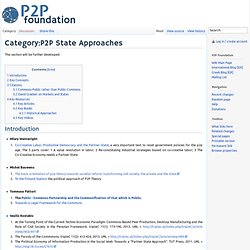
The 3 parts cover: 1 A value revolution in labor; 2 Re-constituting industrial strategies based on co-creative labor; 3 The Co-Creative Economy needs a Partner State Michel Bauwens: Tommaso Fattori: Vasilis Kostakis: At the Turning Point of the Current Techno-Economic Paradigm: Commons-Based Peer Production, Desktop Manufacturing and the Role of Civil Society in the Perezian Framework. tripleC 11(1): 173-190, 2013.
Sortition, for a better democracy. Democracy via lottery What is sortition?
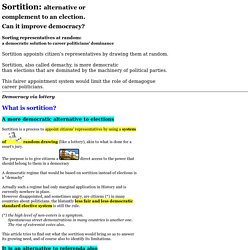
A more democratic alternative to elections. The Roots — and Replacement — of Colonization. Arrow's Theorem (Stanford Encyclopedia of Philosophy) 1.
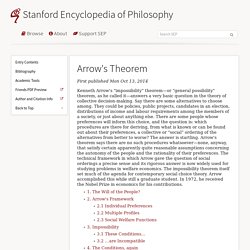
A catalog of weird-ass corners of game theory research. Game theory is the place where politics, economics, psychology and math meet, and it offers the seductive promise of being able to quantify empirically optimal outcomes from thorny problems ranging from whether to go to war to how to split the tab at a restaurant. The published, peer-reviewed world of game theory has reached many "counterintuitive" conclusions, many of which were cataloged by Stanford Postdoctoral Fellow William Spaniel in 2014. You could spend all day getting lost in these. Game Theory Is Really Counterintuitive [William Spaniel] (via Four Short Links) Distinguishing between quantitative and qualitative growth. [Another excerpt from the Economic Design dimension of Gaia Education’s online course in Design for Sustainability.
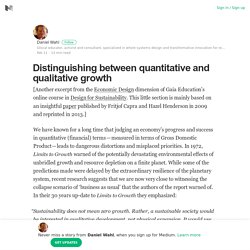
This little section is mainly based on an insightful paper published by Fritjof Capra and Hazel Henderson in 2009 and reprinted in 2013.] We have known for a long time that judging an economy’s progress and success in quantitative (financial) terms — measured in terms of Gross Domestic Product — leads to dangerous distortions and misplaced priorities. In 1972, Limits to Growth warned of the potentially devastating environmental effects of unbridled growth and resource depletion on a finite planet. Unemployed Negativity. The Welfare State Is Committing Suicide by Artificial Intelligence.
Everyone likes to talk about the ways that liberalism might be killed off, whether by populism at home or adversaries abroad.
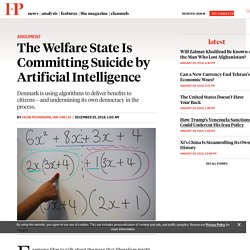
Fewer talk about the growing indications in places like Denmark that liberal democracy might accidentally commit suicide. As a philosophy of government, liberalism is premised on the belief that the coercive powers of public authorities should be used in service of individual freedom and flourishing, and that they should therefore be constrained by laws controlling their scope, limits, and discretion. That is the basis for historic liberal achievements such as human rights and the rule of law, which are built into the infrastructure of the Scandinavian welfare state.
Of ants and men: Ant behavior might mirror political polarization. Could the division of labor in an anthill be driven by the same social dynamics governing the gap between liberals and conservatives?
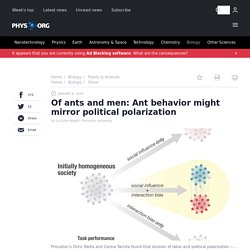
That was the surprising question tackled by Princeton biologists Chris Tokita and Corina Tarnita. Socio: constructivisme structuraliste. Théories systémiques. Wicked problem. A wicked problem is a problem that is difficult or impossible to solve because of incomplete, contradictory, and changing requirements that are often difficult to recognize. It refers to an idea or problem that can not be fixed, where there is no single solution to the problem. “Wicked” problems: What are they, and why are they of interest to NNSI researchers? – Network for Nonprofit and Social Impact. By: Katherine Cooper Not too long ago, I sat in on a meeting of local leaders as they wrestled with an education initiative that they were trying to implement in the community. Although the group’s goal sounded simple enough – introducing literacy programming into existing school and community projects – the conversation soon became complicated.
There is a clear link between improving literacy and improving educational outcomes, but what else poses a problem to educational achievement? Understanding Complexity – Bitgenics. Asking Questions About Power. May 4, 2007 by anthonypash “Critical theory is, above all else, a way to ask questions about power. Monitoring. Dialog Mapping. Self-Organizing Systems. Théorie de la décision.
Kahneman & Tversky. Being Complex. Metamotivation. Computational sociology. Computational sociology is a branch of sociology that uses computationally intensive methods to analyze and model social phenomena. Using computer simulations, artificial intelligence, complex statistical methods, and analytic approaches like social network analysis, computational sociology develops and tests theories of complex social processes through bottom-up modeling of social interactions.[1] In relevant literature, computational sociology is often related to the study of social complexity.[5] Social complexity concepts such as complex systems, non-linear interconnection among macro and micro process, and emergence, have entered the vocabulary of computational sociology.[6] A practical and well-known example is the construction of a computational model in the form of an "artificial society", by which researchers can analyze the structure of a social system.[2][7] History[edit] Background[edit] Agent-based models have had a historical influence on Computational Sociology.
Impact[edit] Theories, Ideas, and Social Concepts. Global Theories. Systemica. Change Management Watch (CMW) - Veille en gestion du changement (VGC) Theory of Change. Theory of Change Community. Image credit: Sidney Harris Theory of Change is essentially a comprehensive description and illustration of how and why a desired change is expected to happen in a particular context. It is focused in particular on mapping out or “filling in” what has been described as the “missing middle” between what a program or change initiative does (its activities or interventions) and how these lead to desired goals being achieved. It does this by first identifying the desired long-term goals and then works back from these to identify all the conditions (outcomes) that must be in place (and how these related to one another causally) for the goals to occur.
These are all mapped out in an Outcomes Framework. The Outcomes Framework then provides the basis for identifying what type of activity or intervention will lead to the outcomes identified as preconditions for achieving the long-term goal. Will it make a difference? An introduction to the impact canvas. Traditional “Theory of Change” approaches need to get Agile Some people criticise the process of creating a Theory of Change due to the risk of it being over-simplified in the face of interconnected global issues.
It can be! You need to articulate how each hunch or hypothesis is linked to another one at a bigger scale, and re-evaluate it all when your results disprove your hunches. Otherwise your investment in an impact strategy of any kind is TOAST. How does it work? · Docs. Organizations in ‘Chaos’: What can chaos theory teach us about organizations? Organizations in themselves are very chaotic. They, too, have many variables that are integrated. External and internal conditions, organizational culture, leadership styles, teams, and people in the teams — including their personality traits — can change the organization’s course.
La società è troppo complessa per avere un solo presidente, dice la matematica. Complexity Rising: From Human Beings to Human Civilization, a Complexity Profile — New England Complex Systems Institute. La théorie des élites. La théorie des élites. Questions philosophiques et politiques. Ironia sovrana. Le élite vecchie e nuove. Chiose a Baricco - Luca De Biase.